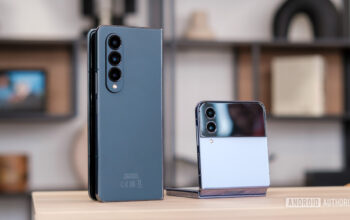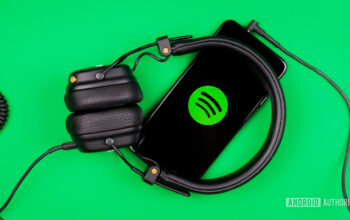The Pixel 4a was lauded as one of the best cheap phones of 2020. Three years later, it’s now starting to look a little long in the tooth. If you’ve been considering an upgrade, one of the most logical places to look is at the latest member of the Pixel A family, the Pixel 7a. What’s changed in the Pixel A series over the past three years? We take a closer look in this Pixel 4a vs Pixel 7a comparison.
Google Pixel 4a vs Pixel 7a: At a glance
Want to make a quick purchase decision? Here’s a quick rundown of the key differences between the Pixel 7a and Pixel 4a.
- The Pixel 4a is a smaller and lighter phone than the Pixel 7a.
- The Pixel 7a has a larger display with a faster refresh rate than the 4a.
- The Pixel 7a has a much more powerful Tensor G2 processor versus the Pixel 4a’s mid-range Qualcomm chip, as well as 2GB of extra RAM.
- The Pixel 4a and Pixel 7a have very different design languages.
- The Pixel 7a takes a major leap forward with its camera.
Google Pixel 4a vs Pixel 7a: Specs
| Google Pixel 7a | Google Pixel 4a | Google Pixel 4a 5g | |
|---|---|---|---|
|
Display |
Google Pixel 7a
6.1-inch OLED |
Google Pixel 4a
5.81-inch OLED |
Google Pixel 4a 5g
6.2-inch OLED |
|
Processor |
Google Pixel 7a
Google Tensor G2 |
Google Pixel 4a
Qualcomm Snapdragon 730G |
Google Pixel 4a 5g
Qualcomm Snapdragon 765G
2.4 GHz + 2.2 GHz + 1.8 GHz, 64-bit |
|
GPU |
Google Pixel 7a
Arm Mali-G710 |
Google Pixel 4a
Adreno 618 |
Google Pixel 4a 5g
Adreno 620
|
|
RAM |
Google Pixel 7a
8GB LPDDR5 |
Google Pixel 4a
6GB LPDDR5 |
Google Pixel 4a 5g
6GB LPDDR5 |
|
Storage |
Google Pixel 7a
128GB UFS 3.1 |
Google Pixel 4a
128GB |
Google Pixel 4a 5g
128GB |
|
Battery and charging |
Google Pixel 7a
4,385mAh battery |
Google Pixel 4a
3,140mAh |
Google Pixel 4a 5g
3,800mAh |
|
Cameras |
Google Pixel 7a
Rear:
– 64MP main Sony IMX787 Super Res Zoom up to 8x – 13MP ultrawide Front: |
Google Pixel 4a
Rear:
12.2MP f/1.8 sensor, 1.4µm pixels, 76-degree field-of-view, autofocus with dual-pixel phase detection, optical + electronic image stabilization Front: |
Google Pixel 4a 5g
Main:
12.2 MP dual-pixel Secondary: Front: |
|
Video |
Google Pixel 7a
Rear:
4K at 30/60FPS 1080p at 30/60FPS Front: |
Google Pixel 4a
4K@30fps, 1080p@30/60/120fps; gyro-EIS |
Google Pixel 4a 5g
4K@30/60fps, 1080p@30/60/120/240fps; gyro-EIS |
|
Audio |
Google Pixel 7a
Stereo speakers |
Google Pixel 4a
Stereo speakers (one downward facing), headphone jack |
Google Pixel 4a 5g
Stereo speakers
|
|
Security |
Google Pixel 7a
In-display fingerprint |
Google Pixel 4a
Fingerprint (rear-mounted) |
Google Pixel 4a 5g
Titan M Security Module |
|
Sensors |
Google Pixel 7a
Proximity sensor |
Google Pixel 4a
Accelerometer |
Google Pixel 4a 5g
accelerometer, gyro, proximity, compass, barometer |
|
Water resistance |
Google Pixel 7a
IP67 |
Google Pixel 4a
No IP rating |
Google Pixel 4a 5g
IP52 |
|
Connectivity |
Google Pixel 7a
Wi-Fi 6 (802.11ax) |
Google Pixel 4a
Wi-Fi 802.11 a/b/g/n/ac, dual-band, Wi-Fi Direct, DLNA |
Google Pixel 4a 5g
Wi-Fi 802.11 a/b/g/n/ac, dual-band, Wi-Fi Direct |
|
Software |
Google Pixel 7a
Android 13 with Pixel UI |
Google Pixel 4a
Android 10, upgradeable to Android 13 |
Google Pixel 4a 5g
Android 11, upgradeable to Android 13 |
|
Materials |
Google Pixel 7a
Gorilla Glass 3 on the front |
Google Pixel 4a
Gorilla Glass 3 on front |
Google Pixel 4a 5g
Gorilla Glass 3 on front |
|
Dimensions and weight |
Google Pixel 7a
152.4 mm x 72.9 mm x 9.0 mm |
Google Pixel 4a
151.3 x 70.1 x 8.2mm |
Google Pixel 4a 5g
153.9mm x 74mm x 8.2mm (8.5mm for mmWave variant) |
|
Colors |
Google Pixel 7a
Arctic Blue, Chalk, Charcoal |
Google Pixel 4a
Just Black |
Google Pixel 4a 5g
Just Black, Clearly White |
The Google Pixel series has evolved a lot over the years, and it’s pretty obvious when comparing the phones side by side. While we’ll focus on the design a bit more in the next section, the internals are also significantly different.
Let’s start with the display. While the Pixel 4a had a respectable 5.81-inch 1080p OLED panel, the Pixel 7a jumps the screen size up to 6.1 inches. It’s still just 1080p, but it does have the advantage of a faster refresh rate at 90Hz. This allows for a smoother experience when scrolling, playing games, and more.
While neither phone has a bad display, as we noted in our Pixel 7a review, the newer A series phone is a pretty noticeable upgrade. What’s even more significant is the SoC that powers each phone.
Rita El Khoury / Android Authority
The Google Pixel 7a is powered by the same flagship-level SoC as its flagship Pixel 7 brethren, the Tensor G2. While this SoC is a bit weaker in pure performance than high-end Qualcomm chips, it comes very close. It even has a few important advantages over competing chips, like superior machine learning algorithms.
In contrast, the Pixel 4a packs a mid-range Snapdragon 730G. While not a bad chipset either, it’s a noticeable downgrade from the Snapdragon 855 onboard the flagship Pixel 4 series. The gulf is even deeper when comparing it to the Pixel 7 family.
David Imel / Android Authority
In day-to-day use, the Pixel 4a is still able to get by, but it’s starting to show its age. If you’re still rocking the 4a, you’ve likely become accustomed to the occasional stutter and lag. Aside from the weaker chipset, you’ll get 128GB of storage on both phones, but the Pixel 7a jumps the RAM up to 8GB, an increase from the 6GB of RAM found on the Pixel 4a.
Most of the other significant changes come down to battery, charging standards, and the camera experience. Still, there are a few other small differences worth pointing out.
The Pixel 4a lacks any kind of water or dust resistance, while the Pixel 7a is IP67 certified. The Pixel 7a also adds improvements like Wi-Fi 6E and Bluetooth 5.2. Furthermore, the fingerprint scanner is embedded in the Pixel 7a’s front display instead of located on the back like the Pixel 4a.
Before we move on to design, battery, and camera, let’s quickly run through the software. While the Pixel 4a uses the same stock-like Android experience as you’d find on the Pixel 7a, it first shipped with Android 10. You can currently upgrade to Android 13, but unfortunately it won’t get Android 14. You’ll still have security patches for another two years, but needless to say, the Pixel 4a is coming close to its software endgame.
The Pixel 7a is just starting life, so that means you’ll see Android OS updates for a full three years, alongside five years of security updates. If you care bout having up-to-date and secure software, the Pixel 7a is definitely the better option.
What about the Google Pixel 4a 5G vs Pixel 7a?
David Imel / Android Authority
Although we focus most of this article on the Pixel 4a, let’s not forget about the Pixel 4 5G. Most of the comparison points will apply to both phones, but let’s quickly address the differences between the Pixel 4a and 4a 5G, and how the latter compares to the Pixel 7a.
In a nutshell:
- The Pixel 4a 5G has a larger 3,885mAh battery. This is still smaller than the 4,385mAh battery on the Pixel 7a.
- The Pixel 4a 5G upgrades to a Snapdragon 765G. This provides a smoother, less laggy experience than the standard 4a. It’s still less powerful than the modern Tensor G2, of course.
- The Pixel 4a 5G and Pixel 7a both have 5G, the standard Pixel 4a doesn’t.
- The Pixel 4a has a larger 6.2-inch panel, though it’s still OLED and has the same refresh rate as the Pixel 4. So even if it’s slightly bigger than the Pixel 7a’s display, the tech inside is much more aged.
- The Pixel 4a 5G has a 16MP wide-angle camera, joining the 12.2MP primary it shares with the standard Pixel 4a. The Pixel 7a is still a massive jump forward; it’s just the gulf is slightly smaller between the 4a 5G and the Pixel 7a than it is between the Pixel 4a vs Pixel 7a.
Aside from the highlighted differences above, expect most of the other points comparing the Pixel 4a and Pixel 7a to apply to the Pixel 4a 5G as well.
Google Pixel 4a vs Pixel 7a: Size comparison
The Google Pixel 4a and 7a represent two very different phases in Google’s design language. After years of sticking to the same iconic design, Google moved its design language to something a bit more ordinary with the Pixel 4 and Pixel 4a. While it wasn’t a bad-looking device, it was certainly a much more reserved design. Google would continue this trend until the Pixel 6 introduced a brand new, bold look.
The Google Pixel 7a builds on the new design language introduced with the Pixel 6 family, improving the unique camera bar and ditching the two-tone color experiment. The result is a phone that stands out in a crowd.
At the end of the day, there is no objectively better design, and it just comes down to preference. However, the Pixel 4a does have a small advantage for those that prefer smaller phones. Weighing 31g less and with a slightly smaller footprint, the Pixel 4a is a very compact device.
The dimensions are also pretty different between the Pixel 4a and Pixel 7a. The phones are 151.3 x 70.1 x 8.2mm and 152.4 mm x 72.9 mm x 9.0 mm, respectively. Even with the size difference, the Pixel 7a is also smaller than most modern phones, but its bigger display and more powerful features do add a little bulk and weight to the mix.
Google Pixel 4a vs Pixel 7a: Camera
David Imel / Android Authority
Google tends to offer one of the best camera experiences available in the mid-range segment. This was true of the Pixel 4a and remains true for the Pixel 7a as well.
The Pixel 4a didn’t have the most powerful hardware, but it did a lot with its 12.2MP Sony IMX363 rear sensor. Google has typically relied heavily on software tricks to really make its camera experience stand out, and our entire team felt the Pixel 4a produced great colors and dynamic range, and solid contrast too.
Pretty much everything taken in decent lighting looked amazing. Even pictures taken in low light were very passable thanks to features like Night Sight.
Up front, the Pixel 4a has a modest 8MP shooter, but it actually takes solid selfies with great highlight retention and shadow detail.
Ultimately the Pixel 4a had a good camera experience, but jumping forward to the Pixel 7a, Google has really upped its game, as we experienced firsthand in our Pixel 7a review.
The Tensor G2 is literally made with photography in mind (among other AI-driven tasks.) And then there’s the hardware.
The Pixel 7a has a 64MP main sensor backed by a 13MP ultrawide lens. This is an on-paper upgrade, but does it really make a difference? In a word, yes. The Pixel 7a has decent color accuracy and great details. It is a noticeable push forward from the days of the Pixel 4 series and one of the best budget cameras we’ve ever experienced. Heck, it’s pretty close to rivaling some flagship phones.
Of course, the ultrawide shooter is something you don’t get with the Pixel 4a. With a decent 120-degree field of view, you’ll find it easy to fit a lot in a shot. It also retains great color accuracy, just like the main shooter.
On the front, you’ll find a 13MP shooter. Again the Pixel 4a had a good selfie experience, but three years is a long time for technology. It’s no surprise the Pixel 7a offers a better experience here, too. There are solid details for important elements like faces, clothing, and even backgrounds are handled well.
Google has seriously upped its photography game in the last years, which is saying a lot considering they were always one of the best. The Pixel 4a might have a decent camera even compared to some budget phones today, but the 7a is a noticeable upgrade.
Google Pixel 4a vs Pixel 7a: Battery and charging
Rita El Khoury / Android Authority
Google has never prioritized battery life on its Pixel phones, though its main flagship models have gotten a bit better in time. However, we can’t really say the same for the Pixel A series.
The Pixel 4a had a pretty tiny battery at just 3,140mAh. During our time with the Pixel 4a, we typically saw around 6.5 hours of screen time and would take our phones to the charger at night with a few percentage of battery life left. The experience was average, but still the one sore spot on the Pixel A’s otherwise near spotless record.
The Pixel 7a has a much bigger battery at 4,385mAh. You’d expect that means a huge leap from where the Pixel 4a started. The good news is you can now make it a full day, but instead of going to bed with a few percentages left, you’re more likely to hover around the 10-15% mark based on our tests. That’s an improvement, but battery life still remains one of the few areas where Google’s mid-ranger doesn’t deliver near absolute perfection.
Moving on to charging, the Pixel 4a charged at 18W and took around 1 hour and 27 minutes to get from zero to full. In contrast, the Pixel 7a takes around 2 hours. It’s not exactly the fastest, though with a bigger battery, we aren’t too surprised. There are also plenty of extra improvements like Adaptive Charging overnight that help make up for this.
One area where the Pixel 7a leaps ahead of the Pixel 4a is wireless charging support. The Pixel 7a is the first Pixel A phone to support wireless charging. It’s not the fastest at just 7.5W, but it’s still a nice extra to have.
Google Pixel 4a vs Pixel 7a: Price
- Pixel 4a
- 6GB/128GB: $349
- Pixel 7a
- 8GB/128GB: $499
The Google Pixel 4a hit the market on August 20th of 2020. It’s no longer sold anywhere, at least outside of second-hand options like Swappa or Ebay. The Pixel 7a was announced May 10th and will be available soon via major retailers like Amazon, Best Buy, and directly from Google itself.
Google has increased its retail price by $150 since the time of the Pixel 4a, but that’s not too surprising with the current economy and the jump upward in specs. Still, if you are looking for something closer to $350, you can now pick up the Pixel 6a for that price!
Google Pixel 4a vs Pixel 7a: Should you upgrade?
Robert Triggs / Android Authority
The Pixel 4a is still a good phone, but you’ll get a much, much better experience with a more modern device like the Pixel 7a. For those who really like to stretch their phones, you could wait another year or so and then abandon ship for the Pixel 8a or whatever comes next.
Would you upgrade from the Pixel 4a to the Pixel 7a?
104 votes
What if you’re ready to jump ship from the Pixel 4a but aren’t necessarily impressed by the Pixel 7a? Our most recommended alternative would be the Galaxy A54 5G. We even pitted the Pixel 7a vs Galaxy A54 5G to make the choice even easier.

Google Pixel 7a
The best sub-$500 camera phone • Solid performance and plenty of RAM • Improved 90Hz display
The essential Pixel experience
The Pixel 7a delivers more premium features than ever for under $500, such as wireless charging support, a 90Hz refresh rate display, and a 64MP camera.


